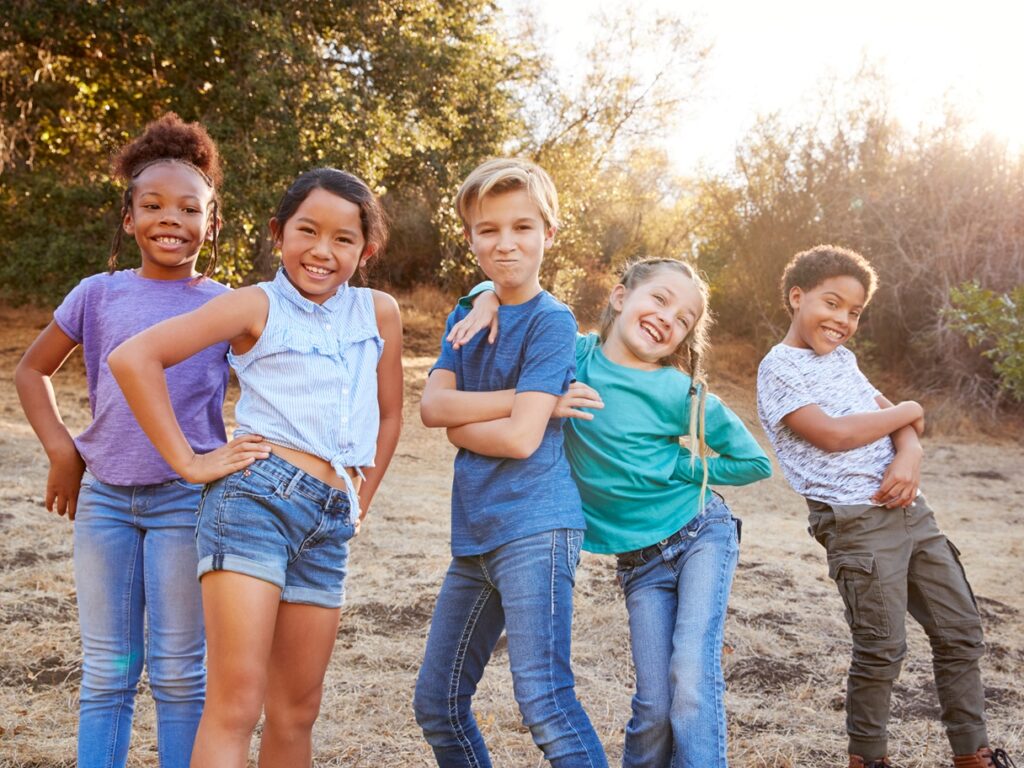ADHD & Friendships… Why It’s So Hard For Some Kids To Make Life-Long Friends

As a parent, watching your ADHD kid from the sidelines, you know all-too-well how often your child is rejected, socially awkward and challenging with their friends. ADHD and friendships have a dicey relationship at best and if your kid is the one on the playground who is turned away from, or not invited over to the Saturday night hangout/sleep over, you know that secretly, other kids have rejected your child. The truth is, many kids with ADHD struggle with friendships more than their typical peers.
ADHD and friendships have a complex and often difficult relationship. Most of the reasons why can be explained through executive function deficits that kids and adults with ADHD have. Why? Because your executive functions (emotional control, time management, planning, organizing etc.) drive friendship behavior. ADHD affects this area of the brain in a unique way, causing delays and or deficits in this set of skills.
The paradox is that kids and adults with ADHD need to practice their emerging social skills in order to strengthen them. But, because they struggle socially, often kids with ADHD are given fewer chances with playmates and friends to get it right. Research also shows that kids with ADHD may also lag behind in emotional and mental maturity as much as 3 to 5 years behind their peers. Which further complicates social relationships and contributes greatly to the challenges with ADHD and friendships.
Understanding ADHD and Friendship
Learning how your child’s brain works is key to helping kids and teens with ADHD make friends because the traits and weaker executive function skills that lead to social snafus cannot be “overcome” or “pushed through.” Kids need time, experience, practice, skill building and then even more time to really improve their weaknesses. And the challenge for most kids is that along the way, they are also having friendship moments that are less than ideal, cementing their understanding of friends.
All too often the memory of “being rejected” or “feeling left out” or “not being invited” demotivates kids to keep trying. In fact, the data is that kids with ADHD are 4 times more likely to be rejected by peers than “typical” kids. This experience of repeated rejection alone is enough to make almost anyone question the value of trying harder to make a new friend.
And yet, as adults, we know that friendship and belonging are key to happiness in life. The 85 year long Harvard Happiness study tells us implicitly that, “close relationships, more than money or fame, are what keep people happy throughout their lives…” The Harvard Gazette.
Friendship is not just having someone, anyone to be with, it means having someone who:
- Accepts you
- Provides support
- Shares experiences
- Comforts you when you’re down
- Shares your interests
- Is curious about you and your life
- Ask you questions, doesn’t just talk about themselves
- Understands give and take
- Is willing to forgive you and asks the same of you
- Wants to spend time with you
As parents, caregivers and educators, it’s important to know that ADHD and friendships need a little extra for sustenance and growth. Kids with ADHD are often GREAT at getting a new friendship going, the struggle is when their executive functions let them down and the after-effects of interrupting, impulsivity, poor impulse control and others affect how their new friend feels about them.
This concept is hard for kids (and many adults) with ADHD to understand because it’s just their way of being in the world. It’s not their intention to be forgetful, messy or to overshare, over talk or any other way of behaving that others judge as “annoying” or “hurtful.” Understanding this simple fact is how you as a parent or I as a coach start to turn the tide on ADHD stereotypes and judgment.
If kids could act better they would.
The shame imposed on ADHD kids for having a different brain is something we have to think about and, arguably, find better ways to have more empathy and compassion for. Because, really, we’re talking about behaviors that happen as a result of poor executive functioning skills, not from intentionally being rude, uncaring or mean.
And, they do get better over time with support.
That said, kids can be cruel and unforgiving. When it comes to ADHD and friendship, we need a different approach if we want better results.
Consider These 9 Core Truths For How ADHD Kids & Teens Approach Friendships
- ADHD kids may not read the room all the time. They miss signals, signs and indicators from the people around them. Because they also struggle with managing their emotions, in conversations they have a tendency to blurt out or interrupt others. This means new friends have to be willing to overlook these behaviors in favor of “having fun” and that they need to express “patience” with having their turn. Both of which are difficult for young children and get better with maturity and age.
- ADHD kids and teens are greatly affected by their environment. Situational variability means that different circumstances influence ADHD traits, so in certain environments kids/teens are more challenged. This means the environment has a key impact on executive function and how intense different ADHD symptoms and behaviors are.
- Being present does not mean kids with ADHD making eye contact. New research shows that making eye contact is painful for children with autism spectrum disorder and for kids with ADHD. If friends think a sign of a good relationship is making eye contact, non-ADHD kids may misread ADHD kids and think they’re not interested, rude or dismissive. Being misread makes it hard to form good relationships.
- Because executive function drives organizing information it has a direct connection to making friends and keeping up with buddies. Coping strategies like routines are key to help people with ADHD keep up with friends and stay connected and in touch. For young kids, Mom and Dad are critical for planning events and play dates, older kids and teens can rely on their cellphones to track dates, but still need parents to buy into driving and getting kids together. If your kid is taking the initiative to make the connection, it’s good to support them with the steps they need your help with.
- Emotions affect how you behave and when fight, flight or freeze takes over, your brain can feel like it goes offline for a bit. For ADHD kids, when they are in a tense or challenging situation that’s “not going well” the tendency for their brain to flood with emotion is common. This means the child cannot access their thinking brain which affects their logical thinking, decision making and more. When kids and teens with ADHD find themselves in yet “another” challenging situation, it’s easy for their minds to “flood” and for them to freeze up. Making it hard to navigate things like a friend reacting to being interrupted by them or to handle the consequences of acting impulsively. The fight, flight and freeze feels paralyzing and kids have a tendency to “avoid” situations like this in the future, even if it is potentially good for them like making a new friend.
- And don’t mistake the notion that people with ADHD “don’t pay attention.” They do, but often they’re paying attention to the wrong stimuli or they’re focused on something that isn’t key to the social exchange between friends. This means that they often miss key social cues. Because many Neurodivergent kids have slower processing speeds, they also respond sometimes a beat too late or may not process all the information at once. This difference in “getting it” can cause kids to react with frustration when the ADHD kid really needs a moment or even patience to sort out what’s going on.
- Memory is also an issue. Often kids with ADHD forget things and have a tendency for someone to be “out of sight and then out of mind.” Memory issues affect more than remembering names; it also impacts keeping up with friends and managing relationships.
- When a lot is happening at once, ADHD kids tend to feel “bombarded” or that they are experiencing sensory overload. This too makes reading the situation hard and may result in the child shutting down and not knowing what to do or say to their friends. This confusion is hard for young kids to really understand and many will walk away. For teens, the same thing can happen but with emotional maturity, often their peers are more attuned to reading the room and can pick up on what their friend is feeling.
- ADHD is a deficit of interest. Interest is key to igniting the ADHD brain and helping people with ADHD pay attention and feel motivated to pay attention, try harder or keep up with their friends. Children with ADHD may find aspects of socializing boring such as social niceties, making chit chat or playing the same game over and over.
Many of the items on this list are affected greatly by maturity and experience. As kids with ADHD start to make longer term friendships, their friends grow along with them and if their brains are not affected by the same things on this list, the skills of compassion, empathy, patience and persistence help to keep the friendship going as the ADHD kid learns the skills to manage their ADHD behaviors.
I also want to say this. ADHD kids bring a tremendous amount to friendships. They are curious, passionate, playful, energetic, and rarely dull or boring. Understanding ADHD and friendship also means that we have to look at the very special qualities ADHD brains bring to the people in their lives.
By no means is it all bad.
The challenges that kids face in their early years with making friends changes with time. As parents, what we really want to do is help our kids to evolve their playbook for making friends. Kids have different personalities and focus in elementary school versus high school, but making friends is always a goal. So help your kid by seeing their skills on a continuum, and like everything, no one is great at everything.
Help your kids learn what they bring to the table.
As a friend, all kids have assets and gifts to share making them a total catch for the right friend or group of friends. The executive function skills that are hard in elementary school can shift with age, so keep up with it Mom and Dad. This is how you’ll know what your kid needs to work on. And it’s how you can help them grow out of old behaviors so they can transform as their interests change.
The mix of skills and self-esteem can help anyone with ADHD make friends. It’s important to remember that different brains are just that, different. Not better or worse, just different.
When you think about making friends as a life-long activity, you’ll start to see how the ADHD person needs to think about friendship a little differently.
If I can help you, please don’t hesitate to reach out.
Please follow my YouTube Channel for more videos on topics just like this one!




